OCCUPY CENTRAL - DAY 21: Full coverage of the day’s events
Mong Kok clashes resume while both students and government officials condemn violence
Protesters and riot police square off in Mong Kok after concerted efforts by both sides to stop an escalation of street confrontations
PUBLISHED : Saturday, 18 October, 2014, 4:53pm
UPDATED : Sunday, 19 October, 2014, 7:13am
Police confront pro-democracy protesters trying to reoccupy Nathan Road in Mong Kok early this morning. Photo: Sam Tsang
New clashes broke out between protesters and police in Mong Kok early this morning, after a day which saw significant progress on attempts to bring students and the government round the table to thrash out a solution to bring three weeks of street protests to an end.

The fresh trouble is understood to have followed an online call "to take the junction of Argyle Street and Nathan Road after midnight", prompting scores of riot police to rush to the scene.
Pepper spray was used at least once to disperse protesters.
The disturbances came as talks aimed at ending the increasingly violent confrontations over the city's electoral future looked set to go ahead. Government and mainstream pro-democracy movement leaders united in condemnation of violent clashes between police and protesters.
Watch: Violent clashes in Mong Kok lead to arrests and injuries overnight
In what appeared to be a concerted attempt to stop an escalation of street confrontations and isolate radical protesters ahead of Tuesday's talks, government No 2 Carrie Lam Cheng Yuet-ngor, the Executive Council and pro-government groups condemned violent clashes on Saturday in Mong Kok.
Their call was echoed by Occupy Central co-founder Dr Chan Kin-man and student leader Lester Shum, who both said talks and non-violence should be the only way forward.
Police commissioner Andy Tsang Wai-hung - who has been absent from public view during the past three weeks of turmoil - also delivered a stern warning over what he described as actions that were "hurting Hong Kong and hurting our society".
Shum's call for non-violent protest - in which he also agreed talks should be within the framework of the Basic Law - came with a caveat that it was the hardline August 31 decision by the National People's Congress on elections that had kept people on the streets. "We are afraid the [Chief Executive] C. Y. Leung camp will try to sabotage the chances of dialogue, and so we need to hold fast to non-violence, which is our biggest strength," he said.
Thirty-three people aged 20 to 66 were arrested after clashes in Mong Kok and Lung Wo Road in Admiralty early on Saturday.
READ MORE: Protesters form new blockades in Mong Kok after night of chaotic clashes with police
Interactive map: Current barricades in Mong Kok
Legislative Council president Jasper Tsang Yok-sing said most peaceful demonstrators would not agree to violence. "It [the violence] definitely exceeds the limit of civil disobedience. I can't see they are conveying any messages. It should not happen."
Forty-one pro-establishment legislators issued a joint statement criticising Saturday's clashes, in which more than 10 police officers and an unknown number of protesters were injured.
In an article in Chinese-language newspaper Ming Pao yesterday, Occupy's Chan called on protesters and police to show restraint. Chan also reiterated that the three Occupy Central organisers and pan-democrats would turn themselves in when the movement ends.
Meanwhile, students were preparing for the two-hour meeting with five government officials at the Hong Kong Academy of Medicine. Professor Leonard Cheng Kwok-hon, president of Lingnan University and an ex-adviser to Leung Chun-ying's election campaign, will moderate.
This article appeared in the South China Morning Post print edition as Fresh clash ahead of talks to end protests
FCC defends its accusation police intimidating reporters covering protests
PUBLISHED : Saturday, 18 October, 2014, 7:20pm
UPDATED : Sunday, 19 October, 2014, 5:01am
Paula Bronstein was arrested on suspicion of criminal damage after jumping onto a car to take photos. Photo: Reuters
The Foreign Correspondents' Club of Hong Kong last night defended its decision to release a statement that suggested police were threatening reporters covering the protests.
On Friday night, only hours after journalists were caught between police and protesters in violent clashes, the FCC released a statement condemning police for the arrest of an American photojournalist, Paula Bronstein, and alleged threats to other reporters.
The club received about a dozen responses to the statement yesterday, several criticising it. One critic said: "It seems that you are condoning Ms Bronstein's illegal acts and are apparently advocating that journalists should be above the law. However, they are not."
Club president Jitendra Joshi stood by the release. "We have every right to be concerned about signs that some police officers have been trying to intimidate journalists covering the protests, and to speak out about it."
Joshi said Bronstein jumped onto the bonnet of a car because she felt "physically threatened".
He added: "We thought she didn't deserve to be arrested for that, or to be detained all night."
Bronstein was arrested on suspicion of criminal damage after the driver complained to the police.
Yesterday, the 60-year-old freelance photographer for Getty told the Postthat she had made a snap decision as she feared for her personal safety. "Somehow I ended up in the space where I was shooting the police and then they were coming towards me and getting pushed into the vehicle. It was borderline chaos.
"It was a very fast-moving situation, pushing and shoving, very tense, very volatile and I was absolutely worried about my personal safety. It was a split second decision, I wasn't up there long. The driver got p***** off and the police arrested me."
Bronstein took one photo when she was on the bonnet and that image explains the reasons for her actions, she said. "If you look at that, it's pretty obvious. You have one policeman with his arms outstretched trying to hold back what looks like 500 people."
Asked if she felt it was acceptable to jump on the car, she said: "Experienced, mature journalists make decisions based on the threat level, on the situation at that moment."
She added that her situation "should have been handled in a mature way, without an arrest, with a conversation".
"I was wearing sneakers and I'm a very petite woman, I'm not an elephant," the Bangkok-based photographer said.
She was released, after paying bail of HK$300, to report back to police later this month.
Separately, Ronson Chan Ron-sing, an editor with Oriental Daily News' online television unit, said he may file a complaint against the police after he was pepper sprayed on Friday night following an argument over where he could film.
He said: "They pushed my colleague with a baton and later pushed both me and my colleague onto the ground. I pointed at them and asked why they used force on my colleague, and then they started to pepper spray me."
This article appeared in the South China Morning Post print edition as FCC defends allegation police are threatening reporters on protests
Police accused of concealing badge numbers during Mong Kok clash
PUBLISHED : Sunday, 19 October, 2014, 5:45am
UPDATED : Sunday, 19 October, 2014, 5:45am
A vest conceals the ID number of a police officer. Photo: K. Y. Cheng
Nearly half the police officers who clashed with protesters in Mong Kok on Friday had their identification numbers obscured, a protester said, alleging they had done so intentionally.
Demonstrator Lau Hoi-ho said about 40 per cent of front-line officers had concealed the ID numbers on their shoulder epaulettes under their reflective vests during the violence, up from about 10 per cent who appeared to do so last week.
Chief Superintendent Hui Chun-tak, of the police public relations bureau, did not confirm or deny the allegation that the officers hid their numbers deliberately. He said the reflective vests were "part of the normal uniform" and that the incident needed looking into.
Protesters maintain that police are hiding their badge numbers to make it difficult to hold them accountable for abuse.
Officers who stood to the side of Nathan Road could be identified clearly, as they wore their vests under their epaulettes. "But many who stood in the middle of Nathan Road, waiting to take action, did not have their identification numbers visible," Lau said.
He asked some officers to make the numbers visible, he said, but was ignored.
Lam Cheuk-ting of the Democratic Party said officers should clearly identify themselves: "If not, the public cannot follow up in case they have complaints."
Officers are obliged to identify themselves upon request when carrying out their duties, either by full name or ID number. Surnames, unless very unusual, are generally not considered specific enough.
Police officers in plain clothes should identify themselves and produce their warrant cards when performing their duties. Officers in uniform are normally not required to produce their warrant cards, which contain their names and badge numbers. But the police website says they should do so upon the public's request "unless the circumstances do not allow or the request is unreasonable".
A police officer shall also ensure he or she is "correctly dressed" when in uniform.
Police in Britain and Canada were criticised for removing their numbers during stand-offs with protesters against Group of 20 summits in 2009 and 2010. Officers in Ferguson, in the US state of Missouri, faced similar accusations this year.
Hong Kong police deploy dogs for the first time in Occupy protests
Police appear to have stepped up their offensive against Occupy Central by using dogs to control protesters.
Officers deployed at least three police dogs early yesterday to help drive back angry crowds who tried to block Lung Wo Road outside the chief executive's office in Admiralty. While kept on leashes, the dogs reacted to the loud chanting with ferocious barking and lunges at the 100-odd protesters. While the animals kept the crowd at bay, officers were able to haul off arrested protesters.
"Whether police dogs are used will depend on the situation," Chief Superintendent Hui Chun-tak, of the police public relations bureau, said. "They are used especially when [the police are] faced with sudden emergencies."
He did not reply when asked if using dogs was an escalation of force by officers after the use of batons, pepper spray and tear gas. He also did not give an answer as to whether the dogs would be used again. Hui said dogs were part of regular patrol units. "They are mainly used for defence," he said.
Thirteen animal rights groups yesterday released a joint statement condemning the use of dogs in dealing with protesters, saying it could be detrimental to both animals and humans.
The Police Dog Unit dates back to 1949. Today there are 117 trained police dogs, made up of 73 patrol dogs, 27 working in drug detection and 17 used for detecting explosives. Most of the dogs are malinois, a medium-size mixed breed known for its agility and high energy.
Jennifer Ngo
This article appeared in the South China Morning Post print edition as Police accused of concealing badge numbers
Police staff associations issue call for unity amid silence over protests from senior officers
Amid widespread puzzlement among rank-and-file officers at silence from their superiors over protests, police staff associations issue call for unity
PUBLISHED : Sunday, 19 October, 2014, 5:45am
UPDATED : Sunday, 19 October, 2014, 6:46am
Andy Tsang, Leung Chun-ying and his wife, Regina Leung Tong Ching-yee, and Deputy Police Commissioner Tony Wong Chi-hung at the Bauhinia Awards ceremony yesterday. Photo: SMP
The events that have rocked Hong Kong over the past three weeks have not only reshaped the political landscape but look set to spark a major shake-up within the police force.
An internal message from the four staff associations that represent all rank and file officers - seen by the Sunday Morning Post - suggests moves could be under way to create a powerful unified body to represent the 28,000 policemen and -women.
Officers have faced fierce criticism of their handling of the unrest. From the controversial decision to use tear gas on September 28 - which many believe was the catalyst for mass protest - to last week's video which appeared to show a group of officers carrying out a violent and sustained attack on unarmed and restrained Civic Party member Ken Tsang Kin-chiu, key operational decisions by the force have raised serious questions over officers' role at the eye of the Occupy storm.
Many men and women in uniform have been puzzled by their superiors' low profile.
Until yesterday neither police commissioner Andy Tsang Wai-hung nor his top lieutenants had appeared in public since the 87 rounds of tear gas were fired. In a statement yesterday, Tsang delivered a stinging attack on what appears to be the increasingly violent approach of some protesters.
Several sources within the force have told the Post that Tsang's absence from the public eye is the result of a dispute between him and Chief Executive Leung Chun-ying. One source said the government was keen for Tsang to stay out of the limelight because he has a tough public image and might have further inflamed the situation.
There appeared to be a frostiness when Tsang and Leung appeared at the Bauhinia Awards ceremony yesterday.
"There is a strong sense of puzzlement in the ranks over why the commissioner and his deputies have played such a low- profile role at a time when the men and women under his control have been put through the Wringer. It would be a huge morale booster if they had been seen more," said one long-serving officer who insisted on anonymity.
"There are some who feel they are being hung out to dry - where is the boss when you need him? Has he been hidden away on orders from the Hong Kong government, or worse, from Beijing?"
Another officer said: "Many think he has fallen out with the CE. He has a reputation for leading from the front, for being a genuine hard man and for supporting his troops - so where the hell is he?"
Yesterday Tsang said of the recent clashes in Mong Kok: "I have a message from the bottom of my heart: these illegal acts are hurting Hong Kong, hurting our society. They seriously disrupt the daily lives of our people, students, workers, businessmen, people requiring medical attention, people from all walks of life.
"To these demonstrators, to these protesters, you may think that your illegal acts have prevented the police [from] going about our duties, disrupted our deployments and even forced us to retreat.
"Superficially these may the case. But let me tell you this: these illegal acts are undermining the rule of law, undermining what Hong Kong has always been relying on to succeed.
"I urge you to think about this: If, from now on, the police fail to uphold [the] law effectively, who is there to benefit? And who is there to gain?"
One consequence of the absence - at least in public - of leadership was the issuing of an unprecedented call for unity by the force's four staff associations.
The message sent on Friday to all police said: "We are in the midst of troubles, unprecedented in our careers. Officers have been and remain subject to extreme antagonism, intimidation, emotional, mental and physical stress, severe fatigue and danger.
"We wish to remind you all that we, the Police Staff Associations, stand united as a Federation in offering our collective full and unwavering support to officers who require our assistance.
"We will continue to endeavour to aid officers to the very best of our ability. We are One.''
Tam Yiu-chung criticised for 'offensive' use of Liverpool anthem
A support group for the families of people killed in the Hillsborough football disaster in England 25 years ago has slammed a pro-establishment politician in Hong Kong for using an anthem at the heart of their quest for justice.
Tam Yiu-chung, chairman of the Democratic Alliance for the Betterment and Progress of Hong Kong (DAB), attempted to salute police officers on Thursday at a special Legislative Council meeting to discuss Occupy Central.
He used the Liverpool FC anthem and motto You'll Never Walk Alone to show his support for the force.
"The police's contributions are recognised by the public. When the protests started, there were people sending good wishes to police at different stations," he said. "This is a really heart-rending situation. I can't help thinking about the Liverpool motto: You'll Never Walk Alone."
The reference, however, has angered local Liverpool fans in Hong Kong, who took to the streets of Admiralty on Friday night clad in the club's signature red jerseys to protest against Tam's "offensive" reference.
For supporters of the English Premier League side, the anthem is inextricably linked to their battle for justice following the disaster in 1989 when police mismanagement of the crowd resulted in a human crush and the deaths of 96 people.
In 2012, an independent report found that police bore responsibility for the disaster and had attempted to conceal their culpability by altering witness statements. British Prime Minister David Cameron subsequently apologised for the injustice.
Kenneth Derbyshire, chairman of the Hillsborough Justice Campaign in Britain, told the Sunday Morning Post that Tam's comments were "out of order".
There were still a number of inquests to be heard, he said.
"I am disgusted by it. With all the inquiries going on, it is like being kicked in the guts," said Derbyshire. "The song is close to everyone's hearts. We've been singing it for years."
A female protester who attended the rally of about 50 Liverpool supporters in Admiralty said: "It was so offensive for [Tam] to use our anthem title for exactly the opposite thing the song stood for.
"This song was for justice, but here he is using it to encourage injustice."
Bryan Harris and Jennifer Ngo
This article appeared in the South China Morning Post print edition as Forcing the issue
http://www.scmp.com/news/hong-kong/article/1619614/police-staff-associations-issue-call-unity-amid-silence-over-protests
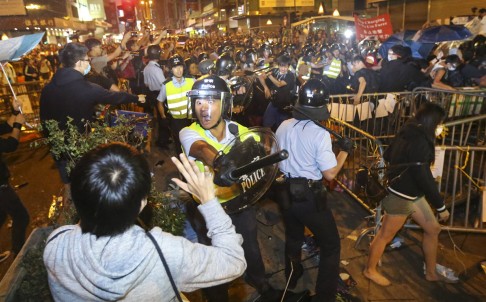
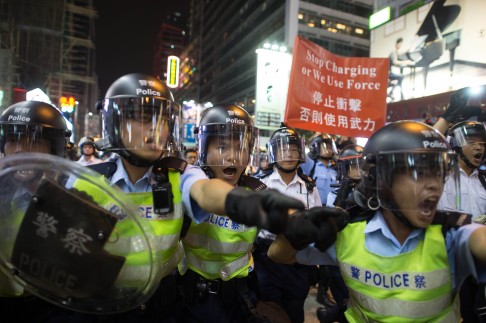
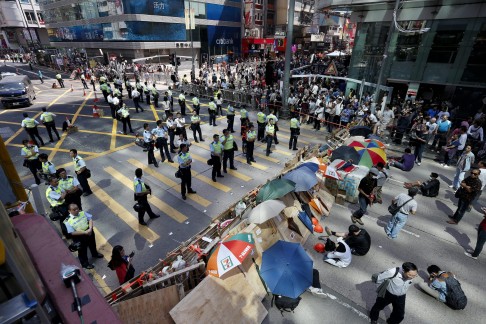
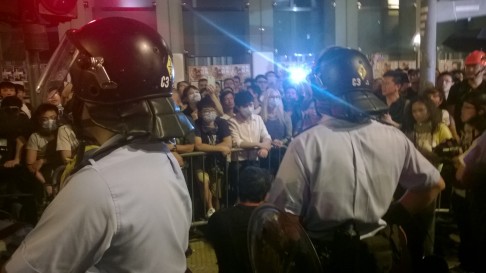
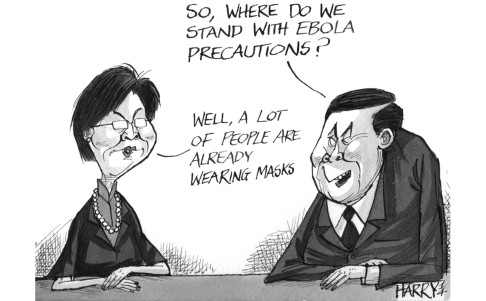
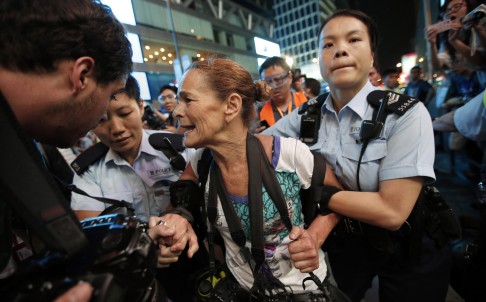


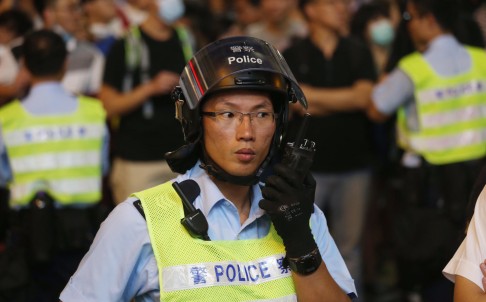

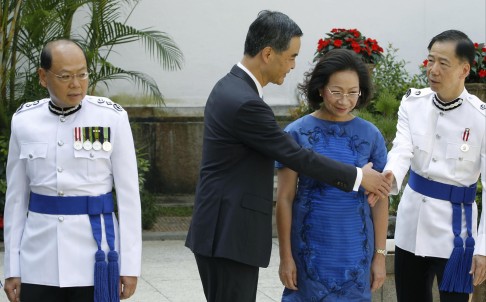
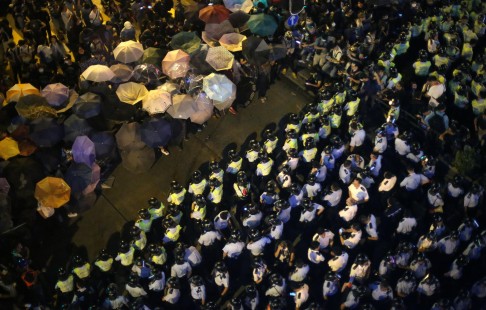
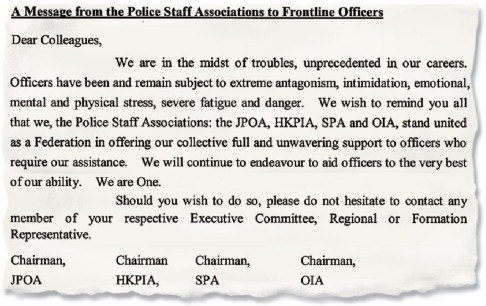
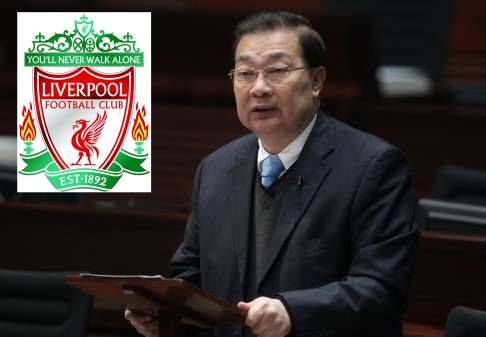
沒有留言:
張貼留言